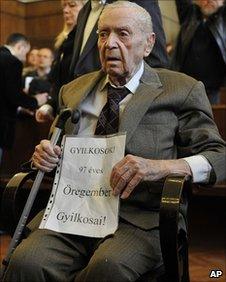'Most wanted Nazi' Sandor Kepiro, 97, tried in Hungary
- Published

A 97-year-old Hungarian accused of massacring civilians in Serbia in 1942 has gone on trial in Hungary.
Sandor Kepiro was listed by the Simon Wiesenthal Center as the world's most wanted Nazi war crimes suspect.
More than 1,200 Jewish, Serb and Roma civilians were murdered over three days by Hungarian forces in a notorious massacre in the city of Novi Sad.
As Mr Kepiro arrived at court he told reporters he was "completely innocent" and called the trial a "circus".
After using a walking stick on his way into the court in Budapest, he took his seat and displayed a printed sheet of paper stating: "Murderers of a 97-year-old man!"
The former police captain is accused of "complicity in war crimes".
Prosecutor Zsolt Falvai detailed the charges. He said Mr Kepiro was directly responsible for the death of 36 Jews and Serbs - including 30 who were put on a lorry on the defendant's orders and taken away and shot.
Mr Kepiro denied the charges. He said that, in fact, he had been "the only person to refuse the order to use firearms", and that he had intervened to save five people about to be killed by a corporal.
'No clemency'
Hundreds of families were rounded up by the Hungarians, allies of Nazi Germany, in January 1942 on the banks of the Danube River in Novi Sad and then shot.
Sandor Kepiro was convicted of involvement in the killings in Hungary in 1944 but his conviction was quashed by the fascist government and he later fled to Argentina.
He returned to Hungary in 1996 and was tracked down by the Nazi-hunting Simon Wiesenthal Center a decade later to a flat opposite a synagogue in Budapest.
Mr Kepiro had sued the director of the Center, Efraim Zuroff, for defamation. But that case was dismissed on Tuesday. The Budapest tribunal said Mr Zuroff had the right to call him a war criminal because of the 1944 verdict.
On Thursday Mr Zuroff said it was imperative that Nazis were brought to justice.
"There can be no clemency, no sympathy and no ignoring of the facts," he said.
- Published13 January 2011
- Published23 March 2009